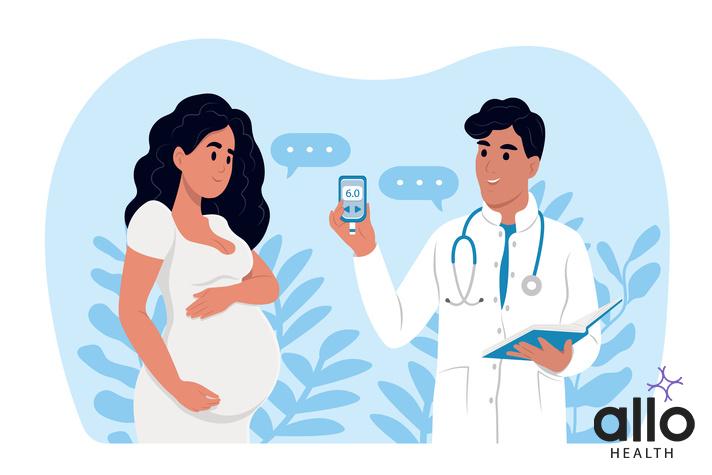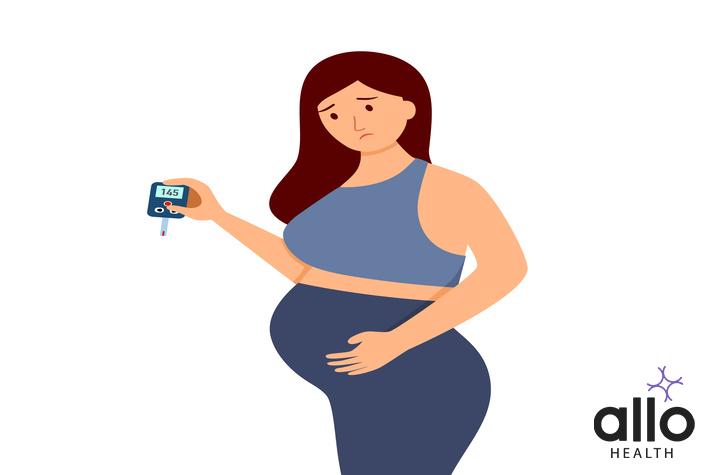What Is The Sugar Pregnancy Test?

Allo Health is dedicated to personalized well-being, offering support and trusted information tailored to individual health goals. The platform emphasizes human-generated content, led by a distinguished medical team of experts, including physicians and sexual health specialists. Their commitment to credibility involves rigorous fact-checking, authoritative research, and continuous updates to ensure accurate, up-to-date information. Allo Health's unique approach goes beyond conventional platforms, providing expert-led insights and a continuous commitment to excellence, with user feedback playing a crucial role in shaping the platform's authoritative voice.

Dr Sanina Mansoor holds MBBS degree from Yenepoya university,Mangalore.She has 8 years of experience working as a medical officer at various health centres and medical colleges.
Why This Was Upated?
Our experts continually monitor the health and wellness space, and we update our articles when new information became available.
Updated on 21 December, 2023
- Article was updated as part of our commitment to diversity, equity, and inclusion.

"The following blog article provides general information and insights on various topics. However, it is important to note that the information presented is not intended as professional advice in any specific field or area. The content of this blog is for general educational and informational purposes only.
Book consultation
The content should not be interpreted as endorsement, recommendation, or guarantee of any product, service, or information mentioned. Readers are solely responsible for the decisions and actions they take based on the information provided in this blog. It is essential to exercise individual judgment, critical thinking, and personal responsibility when applying or implementing any information or suggestions discussed in the blog."
If you suspect that you might be pregnant, it’s essential to confirm your pregnancy using a reliable pregnancy test. While there are many pregnancy tests available in the market, including over-the-counter and online options, some women prefer to use a homemade pregnancy test that involves sugar. The sugar pregnancy test has been around for generations and is often used as an alternative to conventional pregnancy tests.
What Is The Sugar Pregnancy Test?
. Pregnancy tests that are commonly used and trusted are based on detecting the hormone human chorionic gonadotropin (hCG) in a woman’s urine or blood.
Here’s some general information about pregnancy tests and the importance of relying on medically approved methods:
- Traditional Pregnancy Tests: Traditional pregnancy tests are usually urine-based tests that can be easily purchased over-the-counter at drugstores or obtained from healthcare providers. These tests detect hCG in a woman’s urine, which is produced by the placenta after a fertilized egg attaches to the uterus. They are generally very accurate when used correctly.
- Blood Pregnancy Tests: Blood tests for pregnancy are usually conducted at a doctor’s office or a medical lab. There are two types of blood tests: qualitative hCG tests, which only check for the presence of hCG, and quantitative hCG tests, which measure the exact amount of hCG in the blood. Blood tests are more sensitive and can detect pregnancy earlier than urine tests.
- Digital Pregnancy Tests: These are similar to traditional urine tests, but they provide a digital display of the results (e.g., “pregnant” or “not pregnant”) instead of relying on lines or symbols.
- Homemade or DIY Pregnancy Tests: There is a variety of unproven and unreliable homemade pregnancy tests that people have used over the years. These methods are not scientifically validated, and their accuracy is questionable. One such rumored method is using sugar to detect pregnancy, but there is no scientific basis for this claim, and it is not a recommended or reliable method.
When it comes to pregnancy testing, it’s essential to use reputable and medically approved tests to get accurate results. If you suspect you might be pregnant, it’s best to use a commercial pregnancy test or visit a healthcare professional to get a reliable diagnosis and appropriate guidance. Remember that if you receive a positive result, it’s crucial to seek prenatal care promptly for a healthy pregnancy.
The Science Behind the Sugar Pregnancy Test
there is limited scientific evidence to support the effectiveness or reliability of the “sugar pregnancy test.” It is essential to note that this method is not recommended by medical professionals, and relying on it for pregnancy detection can lead to inaccurate results and potential health risks.
The sugar pregnancy test is a homemade or DIY method that is not scientifically validated. It involves mixing a pregnant woman’s urine with sugar and observing changes in the mixture to determine pregnancy. The specific details of the test may vary based on different online sources, but the general process typically goes as follows:
- Collect urine: The person suspected of being pregnant collects a sample of their first-morning urine. This is because the concentration of hCG, the pregnancy hormone, is often highest in the morning.
- Mix urine with sugar: A small amount of sugar is added to the urine sample. Some sources suggest using a few tablespoons of sugar, while others may recommend a different amount.
- Observe changes: The mixture is then left for a specific period, typically ranging from a few minutes to hours, depending on the source. Positive results are said to manifest as clumping, frothing, or other changes in the mixture.
The claimed science behind the sugar pregnancy test is that hCG, if present in the urine, will interact with the sugar in a way that causes observable changes in the mixture. There is no scientific basis for this method, and it should not be relied upon for accurate pregnancy detection. Several factors make the sugar pregnancy test unreliable and unsuitable:
- Lack of scientific validation: The sugar pregnancy test has not been subjected to rigorous scientific testing and validation. It is not endorsed or recognized by medical professionals or organizations.
- Subjectivity of interpretation: Interpreting the results of the sugar pregnancy test is subjective and open to personal bias, leading to potential misinterpretations.
- Inconsistent results: Reports from individuals who have tried the sugar pregnancy test vary widely, with some claiming accurate results and others reporting completely different outcomes.
- Health risks: Depending on the ingredients used and the handling of the urine sample, there may be potential health risks associated with this unvalidated method, such as contamination or exposure to harmful bacteria.
For reliable pregnancy detection, it is strongly recommended to use commercially available and scientifically validated pregnancy tests, such as urine-based home pregnancy tests or blood tests conducted by healthcare professionals. These tests have undergone rigorous testing and are designed to provide accurate results.
If you suspect you may be pregnant, it is essential to seek proper medical advice and prenatal care from healthcare professionals to ensure a healthy pregnancy and well-being for both the mother and the baby.
Advantages and Limitations of Sugar Pregnancy Test
Advantages (as claimed by proponents)
- Low cost: One of the primary advantages of the sugar pregnancy test, as claimed, is its low cost. Since it involves using common household sugar, it may be perceived as an affordable alternative to commercially available pregnancy tests.
- Easy to perform: The process of conducting the sugar pregnancy test is relatively straightforward and can be done at home without the need for specialized equipment or professional assistance.
- Home availability: Supporters of this method often highlight the convenience of being able to perform the test in the comfort of one’s home, avoiding the need to visit a pharmacy or doctor’s office.
- Non-invasive: The sugar pregnancy test is considered non-invasive, as it does not require collecting blood samples or undergoing medical procedures.
Limitations and Concerns
- Lack of scientific evidence: The most critical limitation of the sugar pregnancy test is the complete lack of scientific evidence to support its effectiveness. It has not been rigorously tested or validated, and its reliability and accuracy are unknown.
- Subjectivity of interpretation: The results of the sugar pregnancy test are subject to personal interpretation, which can lead to subjective and potentially inaccurate outcomes.
- Inconsistent results: Reports from individuals who have tried the sugar pregnancy test vary widely, with some claiming accurate results and others reporting completely different outcomes. This inconsistency raises concerns about its reliability.
- Potential health risks: Depending on how the test is conducted and the handling of urine samples, there may be risks of contamination or exposure to harmful bacteria, which could pose health risks.
- False positives and negatives: Without scientific validation, it is unclear how well the sugar pregnancy test can distinguish between true positive and negative results, potentially leading to misleading outcomes.
- Delayed results: Unlike some commercial pregnancy tests that provide results within minutes, the sugar pregnancy test might require longer waiting periods, leading to increased anxiety and uncertainty.
- No detection of early pregnancy: Most commercially available pregnancy tests are sensitive enough to detect pregnancy even in its early stages, sometimes before a missed period. The lack of sensitivity and specificity of the sugar pregnancy test is a significant concern.
- No guidance for next steps: If someone suspects they are pregnant and the sugar test provides a positive result, there is no clear guidance on what to do next. Seeking medical advice and prenatal care are crucial steps after a positive pregnancy test result, which the sugar test cannot provide.
The sugar pregnancy test is not a reliable or scientifically validated method for detecting pregnancy. It should not be used as a substitute for commercially available pregnancy tests or medical advice. If you suspect you may be pregnant, it is best to use a reputable pregnancy test or seek guidance from healthcare professionals to ensure appropriate care and support.
How To Test Pregnancy With Sugar?

The sugar pregnancy test is not a reliable or scientifically validated method for detecting pregnancy. There is no specific recommended time to perform a sugar pregnancy test because it is not a medically endorsed or accurate way to determine pregnancy. Instead, if you suspect you might be pregnant, it is essential to use commercially available and scientifically validated pregnancy tests or seek medical advice from healthcare professionals.
There is some guidance on when to use traditional pregnancy tests, which are widely recognized and recommended:
- Missed Period: The most common and reliable time to perform a pregnancy test is after you have missed your expected menstrual period. Most over-the-counter pregnancy tests are designed to detect the pregnancy hormone human chorionic gonadotropin (hCG) in urine, and they are more accurate after a missed period.
- First-Morning Urine: If you are testing before a missed period or are unsure about the timing, using your first-morning urine is generally recommended. The concentration of hCG is typically higher in the morning, which can increase the accuracy of the test.
- Follow Test Instructions: Always follow the instructions provided with the pregnancy test kit. Different tests may have varying sensitivity levels and testing methods, so carefully read and follow the manufacturer’s guidelines.
- Early Testing: Some pregnancy tests claim to detect pregnancy even a few days before the missed period. These early detection tests are designed to be more sensitive to lower levels of hCG. Keep in mind that testing too early may yield false-negative results, as hCG levels might not be detectable yet.
- Confirmatory Test: If you receive a positive result on a home pregnancy test, it is advisable to confirm the result with a follow-up test. You can either repeat the home test after a few days or visit a healthcare professional for a blood test, which can measure hCG levels more accurately.
Remember, if you suspect you might be pregnant, it is crucial to use reliable pregnancy tests and to seek medical advice for confirmation and appropriate prenatal care. Relying on unproven methods like the sugar pregnancy test can lead to inaccurate results and potentially harmful delays in seeking necessary medical attention.
The Accuracy of Sugar Pregnancy Test Results
The sugar pregnancy test lacks scientific research, and there are no standardized procedures or guidelines for conducting it. As a result, the accuracy of its results is questionable and highly unreliable. The interpretation of the sugar test relies on subjective observations, leading to a high potential for false positives or false negatives.
Several factors contribute to the lack of accuracy of the sugar pregnancy test:
- No Targeted Hormone Detection: Traditional pregnancy tests are designed to detect the hormone human chorionic gonadotropin (hCG), which is produced by the placenta after implantation occurs. These tests are highly sensitive and specific to hCG, making them accurate indicators of pregnancy. The sugar pregnancy test, does not target any specific hormone or pregnancy marker, leading to ambiguous and inconclusive results.
- Subjective Interpretation: The sugar pregnancy test results are subject to personal interpretation, which can lead to varying outcomes among different individuals. Observing changes in the sugar and urine mixture may be influenced by lighting, temperature, and individual biases, making it highly unreliable.
- Lack of Sensitivity: Commercially available pregnancy tests have been optimized for sensitivity and can detect hCG even at very low levels. In contrast, the sugar pregnancy test does not have the same sensitivity and is unlikely to provide accurate results, particularly in the early stages of pregnancy.
- Inconsistent Results: Reports from individuals who have tried the sugar pregnancy test vary widely, with some claiming accurate results and others reporting completely different outcomes. This inconsistency highlights the unreliability of the method.
- No Scientific Validation: The sugar pregnancy test has not undergone rigorous scientific testing or validation. Without empirical evidence and clinical trials, its accuracy and reliability cannot be determined.
How to Interpret the Results of a Sugar Pregnancy Test
There is no reliable evidence to support its accuracy, and it is not recommended or endorsed by medical professionals. As such, there are no standard guidelines or established methods for interpreting the results of a sugar pregnancy test.
For the sake of providing comprehensive information, we can explain how the interpretation process is generally described by some proponents of this unproven test. Keep in mind that this information is purely for educational purposes and not for actual use as a pregnancy detection method.
Interpreting the Results of a Sugar Pregnancy Test
- Clumping or Frothing: Some proponents claim that if the sugar and urine mixture forms clumps or froths up, it may be interpreted as a positive result, indicating pregnancy. The specific appearance and texture of the clumps or froth are often not well-defined, leaving significant room for subjective interpretation.
- No Change or Minimal Reaction: Conversely, a lack of noticeable changes in the sugar and urine mixture may be interpreted as a negative result, suggesting no pregnancy. “Minimal reaction” can be challenging to define and could lead to ambiguous interpretations.
These interpretations are not based on scientific evidence or medical validation. The sugar pregnancy test lacks specificity and sensitivity, making it highly unreliable and unsuitable for detecting pregnancy accurately. Additionally, the lack of standardized procedures and subjective nature of interpretation further contribute to its lack of credibility.
For reliable pregnancy detection, it is essential to use commercially available and scientifically validated pregnancy tests, such as urine-based home pregnancy tests or blood tests conducted by healthcare professionals. These tests are designed to detect the pregnancy hormone human chorionic gonadotropin (hCG) accurately and provide clear results. If you suspect you might be pregnant, seek medical advice promptly to ensure appropriate care and support.
Common Misconceptions About Sugar Pregnancy Tests
These misconceptions are based on misinformation and lack of scientific evidence. Let’s explore them in detail:
- Scientific Validity: One of the most significant misconceptions is that sugar pregnancy tests are scientifically valid and can accurately detect pregnancy. In reality, there is no scientific evidence or clinical research supporting the accuracy or reliability of this method. It lacks specificity and sensitivity to detect the pregnancy hormone hCG, which is essential for accurate pregnancy testing.
- Affordability and Convenience: Some may believe that sugar pregnancy tests are a cheap and convenient alternative to commercially available tests. While sugar is inexpensive and readily available, the test’s lack of reliability negates any perceived benefits in terms of cost or convenience.
- Early Detection: There is a misconception that sugar pregnancy tests can detect pregnancy earlier than traditional home pregnancy tests. Without targeting specific pregnancy hormones like hCG, the sugar test cannot offer early detection capabilities. Medically approved tests are designed for early pregnancy detection, but the sugar test is not scientifically validated for this purpose.
- Natural or DIY Approach: The use of household sugar in the test may lead some to believe that it is a “natural” or DIY approach to pregnancy testing. The lack of scientific validity and potential health risks associated with the test outweigh any perceived advantages.
- Accuracy Based on User Reports: Some individuals claim to have experienced accurate results with sugar pregnancy tests, leading to the misconception that it can be a reliable method. These reports are anecdotal and not supported by scientific data. Individual experiences with the sugar test are highly subjective and lack the necessary controls and standardization to be considered reliable.
- Harmless Testing: It is a common misconception that since sugar is generally safe for consumption, the test itself poses no harm. The sugar pregnancy test involves handling urine, which can carry potential health risks if not handled properly or if contaminated.
- Alternative to Medical Tests: Some may believe that sugar pregnancy tests can replace medical-grade tests conducted by healthcare professionals. In reality, medically approved tests are designed for accuracy and safety, and they are the standard for confirming pregnancies.
Risks Associated with Performing a Sugar Pregnancy Test at Home
Performing a sugar pregnancy test at home poses several risks and potential complications, as it is not a medically validated or recommended method for detecting pregnancy. While household sugar itself is generally safe for consumption, the handling of urine and the lack of scientific validation are the primary concerns. Here are the risks associated with performing a sugar pregnancy test at home:
- Inaccurate Results: The most significant risk of using a sugar pregnancy test is the likelihood of inaccurate results. The test lacks specificity and sensitivity to detect the pregnancy hormone hCG, making it highly unreliable. Relying on inaccurate results could lead to confusion, delayed medical care, or unnecessary anxiety.
- False Positives or Negatives: Due to the subjective nature of interpretation, false-positive or false-negative results are common with the sugar pregnancy test. A false positive could lead to unnecessary stress, while a false negative may delay necessary medical attention during pregnancy.
- Delayed Medical Care: Relying on an unproven method like the sugar pregnancy test could delay seeking proper medical care and prenatal support if a pregnancy is present. Early prenatal care is crucial for the health of both the mother and the baby.
- Health Risks: Handling urine can carry potential health risks if not done properly. Improper hygiene practices can lead to contamination or exposure to harmful bacteria, potentially causing infections or other health concerns.
- Unsanitary Conditions: Performing the test at home may lack the sterile and controlled conditions used in medically approved tests. Without appropriate precautions, there may be a risk of contamination, especially if the test is not conducted properly.
- No Clear Guidance: If the sugar pregnancy test yields a positive result, it does not provide any clear guidance on the next steps to take. Commercially available pregnancy tests often include instructions and information about what to do after a positive result, which the sugar test cannot provide.
- Reliance on Unproven Methods: Relying on unproven and unscientific methods for pregnancy testing may lead to the false belief that the test is accurate. This could result in individuals dismissing the need for proper medical care and using unvalidated methods for future health concerns.
- Potential Emotional Impact: A false positive or negative result from the sugar pregnancy test may lead to emotional distress, anxiety, or confusion for the individual who performed the test.
Frequently Asked Questions
(1) How does a sugar pregnancy test work?
The sugar pregnancy test is a homemade method that claims to detect pregnancy by mixing urine with sugar. Proponents suggest that if pregnant, hCG (the pregnancy hormone) reacts with sugar, causing changes like clumping or frothing in the mixture. There is no scientific evidence to support this claim, and the test’s accuracy and reliability are questionable. Medically approved pregnancy tests target specific hormones and are more accurate.
(2) Can the sugar pregnancy test detect early pregnancy?
No, the sugar pregnancy test lacks the sensitivity required to detect early pregnancy. Commercially available tests are designed to detect low levels of hCG, enabling early detection even before a missed period. The sugar test’s lack of specificity for pregnancy hormones makes it unsuitable for early detection.
(3) Are sugar pregnancy tests accurate?
No, the sugar pregnancy test is not accurate or scientifically validated. Its subjective interpretation and lack of standardized procedure lead to inconsistent results. Relying on this test may lead to false positives or negatives, causing confusion and potential delays in seeking proper medical care.
(4) Is the sugar pregnancy test safe?
While sugar itself is generally safe for consumption, the handling of urine poses potential health risks. Improper hygiene practices can lead to contamination or exposure to harmful bacteria. Additionally, relying on an unproven method for pregnancy testing may lead to unnecessary anxiety and emotional impact.
(5) Can I use the sugar pregnancy test as a reliable method for pregnancy detection?
No, the sugar pregnancy test is not a reliable or recommended method for detecting pregnancy. It lacks scientific validation and is not endorsed by medical professionals. To ensure accurate results and appropriate medical care, it is best to use medically approved pregnancy tests, such as urine-based home tests or blood tests conducted by healthcare professionals. Seeking timely medical advice is crucial for proper prenatal care and support. Avoid relying on unproven methods like the sugar pregnancy test to ensure your health and well-being.
(6) Can the sugar pregnancy test replace a commercial pregnancy test?
No, the sugar pregnancy test should not be used as a substitute for commercially available pregnancy tests. Medically approved tests have undergone rigorous testing and validation, providing accurate and reliable results. Relying on the sugar test may lead to inaccurate outcomes and delays in seeking proper medical care during pregnancy.
(7) Is the sugar pregnancy test a cost-effective option?
While household sugar is inexpensive, the sugar pregnancy test’s lack of reliability outweighs any perceived cost-effectiveness. Commercially available tests are reasonably priced and offer reliable results, making them a more suitable investment for accurate pregnancy detection.
(8) Can a positive sugar pregnancy test result confirm pregnancy?
No, a positive sugar pregnancy test result cannot confirm pregnancy. Without targeting specific pregnancy hormones like hCG, the test’s positive result is not reliable. To confirm pregnancy, use medically approved tests or consult a healthcare professional for appropriate testing and prenatal care.
(9) What should I do if the sugar pregnancy test shows a positive result?
If the sugar pregnancy test yields a positive result, it is crucial to seek confirmation through medically approved tests, such as home pregnancy tests or blood tests performed by healthcare professionals. Positive results should not be solely relied upon, and prompt medical advice is necessary for appropriate care during pregnancy.
(10) How can I ensure accurate pregnancy testing at home?
To ensure accurate pregnancy testing at home, use commercially available and scientifically validated pregnancy tests. Follow the test instructions carefully, use first-morning urine if testing early, and interpret the results within the specified time frame. If there is any doubt or concern, consult a healthcare professional for proper testing and guidance. Accurate testing is essential for timely prenatal care and support.






































